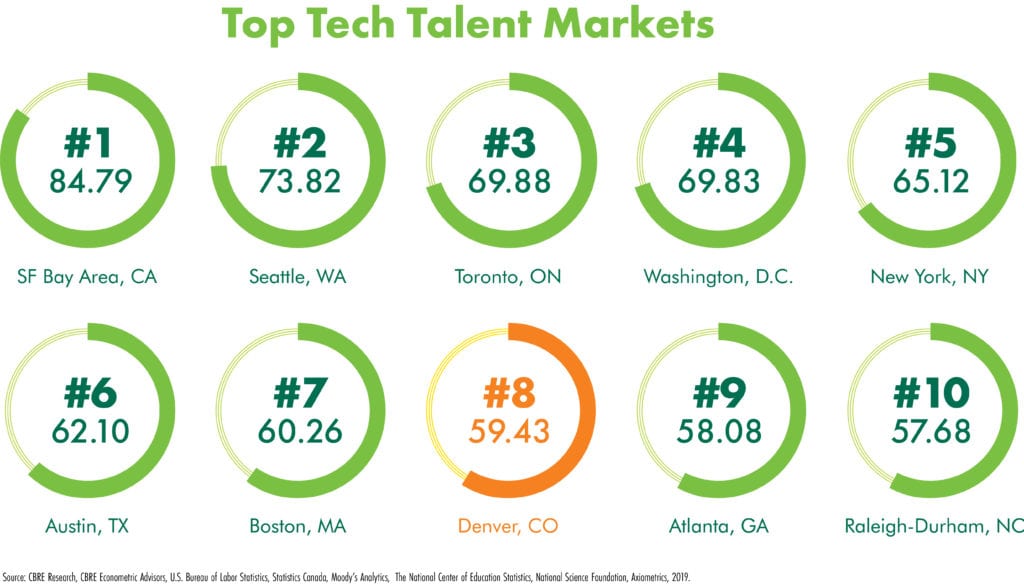Denver has an incredible window of opportunity ahead of itself. Areas with high concentrations or clusters of rapidly growing tech firms have created economic growth and changed office market dynamics. Tech companies leased more than 2 million square feet in metro Denver in 2018 and more than 907,000 sf through the third quarter of this year, according to our research.
While Denver has done a remarkable job of growing local tech firms and attracting second offices, to truly progress from a tier 2 to tier 1 city, Denver needs to cement itself as a destination for large corporate tech headquarters. The availability of tech talent and location of office space are both important factors that can further Denver’s prominence on the national and international tech stage.
• Availability of tech talent in Denver. According to CBRE’s 2019 Scoring Tech Talent report, Denver moved up in this year’s rankings, now ranked the eighth most attractive market for tech talent, replacing RaleighDurham, North Carolina. Although tech talent labor pools have deepened over the past five years, job creation has outpaced qualified professionals, leading to rising labor costs and increased competition to attract and retain talent. In 2018, 107,170 people held tech occupations in Denver (roles including: software developers and programmers; computer support, database and systems; computer and information systems managers; and technology engineering-related). This reflects a 30.9% job growth rate from 2013 compared to nontech occupations only growing 8% over the same period.
Colorado’s tech talent pipeline continues to grow, fueled both by homegrown talent from Colorado universities and in-migration of highly educated professionals from out of state who are attracted to the region’s job opportunities and live-work-play culture. Colorado’s tech sector also is nurtured by an entrepreneurial culture that is uniquely supportive, providing extensive resources to start-ups as they launch and mature. Venture capital-funded companies founded by alumni of top regional universities include Groupon, Vir Biotechnology, 23andMe, Wheels Up and Uptake. The University of Colorado alone has raised $5.2 billion for 323 start-up companies.
As Denver has been amassing the talent required to attract large tech headquarters, talent should be an asset, not an obstacle, in the growth of the tech industry in Denver.
• Office locations available around Denver. While talent is one main component in attracting large tech headquarters, location also is a key driving factor.
 The fact is larger markets like San Francisco are running out of space, and Denver should be seen as an opportune solution for new tech headquarters. New development in San Francisco will likely be restricted for years to come. Under Prop M, there is currently only 896,752 sf available for office space allocation while projects are seeking 5.8 million sf of space. Meanwhile, Denver already has plans to reinvigorate and grow neighborhoods in and around downtown.
The fact is larger markets like San Francisco are running out of space, and Denver should be seen as an opportune solution for new tech headquarters. New development in San Francisco will likely be restricted for years to come. Under Prop M, there is currently only 896,752 sf available for office space allocation while projects are seeking 5.8 million sf of space. Meanwhile, Denver already has plans to reinvigorate and grow neighborhoods in and around downtown.
Neighborhoods such as River Mile, River North, 16th Street Mall and Denver’s central business district (newly branded “Upper Downtown” or “UpDo”) call for a more dense, strategic retail-residential-office synthesis, focusing on street-level activation and more green space. While the limited spaces currently available in the urban core can work for attracting secondary offices to the Denver area, locations such as the Central Platte Valley and RiNo are ripe for new development and well-positioned for building brand new, world class headquarters such as HomeAdvisor’s new headquarters. Office spaces in the growing Central Platte Valley and RiNo neighborhoods will not only have great proximity to the city, but also new amenities that support connectivity to large transportation hubs, local restaurants and shops, reinforcing the coveted live-work-play lifestyle.
Denver already is on the trajectory of moving from a tier 2 to tier 1 city. Tech tenants currently are searching for another 1.5 million sf of office space in the Denver market, so we need to maintain our momentum and not settle for being a second office city, but rather push forward to become a city that is known for housing the top corporate headquarters in the U.S.













